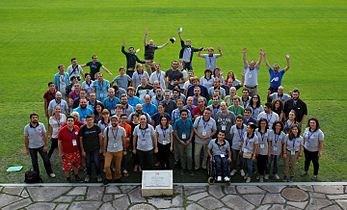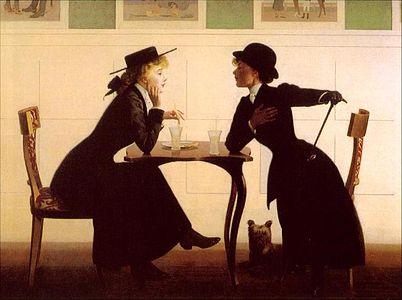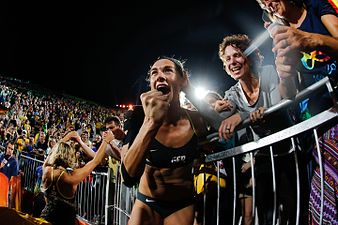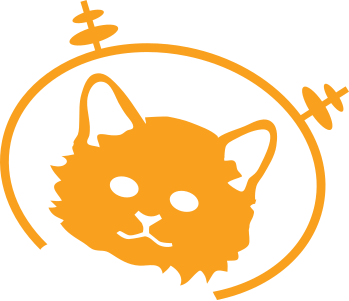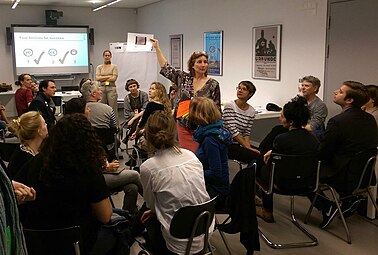Learning and Evaluation/Newsletter/2016/3/10/zh
部落格、活動
留下你的想法!
这个新計畫是一系列的调查(績效和脉冲的调查)举办的基金会,以了解更多有关社区组织提供的。
社群參與洞見的主要目标是改善维基媒体基金会與其所服务的社群之间的对正。这是一个新的过程、由学习和评价团队所管理,來为维基媒体基金会的团队从社群工作收集数据。
CE见解由3年度调查。维基媒体基金会的年度绩效调查最大的三个,和将有一个专注于信息服务团队的年度计划。它将专注于5核心观众:非常活跃/参与编辑者(例如编辑与100 +每月编辑、监管员、用户查核员、监督员、管理员),活跃编辑牧师/创建内容(例如编辑有超过5但低于每月100编辑),维基媒体子公司或项目领导人(如WMDE、魅力、教育计划、活动组织者),志愿者开发人员,技术合作者(例如用户支持WMF软件开发)、外部运动伙伴(例如维基百科零合作伙伴、谷歌、大学、外部人员)。创建性能调查与不同的团队提出的问题基础,反过来,也支持这项调查过程。
The 2 Pulse Surveys are smaller versions of the performance survey that, on top of collecting data about the 5 core audience groups mentioned above, will also focus on getting data related to (1) community needs and feedback about WMF projects, programs and services; (2) measuring outcomes of the WMF's projects, programs and services; (3) and input to WMF future projects.
By measuring, year over year, how well we are engaging with our global community in the work that we do and what impact we have as an organization, we believe we are implementing one of our guiding principles: shared power, and working towards the goal of partnering with communities in every strategic decision and core workflow.
CE Insights is launching the test survey to select groups of users during Ocotber. The Performance Survey will be distributed broadly towards the end of November. If you see a message to take the survey, please use the opportunity to share your views with us!
Wikimedia CEE: 5 Years of the regional meet-up to share learning
As a platform for creating and maintaining regional network, venue for exchanging experiences and learnings and catalyst for organizing collaborative projects, Wikimedia CEE Meeting is the cornerstone of Wikimedia Central and Eastern Europe regional collaborative.
Although the discussions around having a CEE meeting started already in 2005, it took a more concrete form during meet-up on Wikimania in Haifa in 2011 and as a result the first meeting took place in Belgrade, Serbia in 2012. Throughout the years the involvement of regional communities has increased - for 2014 meeting in Kyiv, Ukraine a community consulted needs assessment was carried out for the first time and 2015 meeting in Voore, Estonia had an international program committee. In 2016 wider community was actively involved already in the bidding process for 2017 meeting. Evidently CEE Meeting continues to grow as a collaborative effort.
The idea and theory of change behind CEE annual meeting is rather simple - by getting people from the same region together and engaging them in real life discussions, workshops and social events, communities are strengthened and capacities are developed, partners become part of regional collaboration, and the public gets engaged with wikimedia projects, so that we build an established regional network of local Wikimedia affiliates and external partners, with wider public engagement. (See also logic model of CEE Meeting)
On one hand this results in more competent community members who have had a chance to exchange experiences and learnings, increasing their capacity and ability to perform on the local level. On the other hand it provides an excellent support for building networks and implementing number of great project ideas. For example 100wikidays, Wikimedia CEE Spring and Wikidojo are just some of the outcomes of CEE Meetings. This year there were discussions around education and GLAM projects and there is a high probability of increased CEE collaboration on these fields in near future.
For Wikimedia Eesti regional meeting is especially important because of the possibility to receive concentrated learnings from peers in an unmediated form. For a small chapter such transmission of knowledge is of very high value. On the other hand discussions and sharing on regional meetings provide a chance to multiply the impact that Estonian experiences and accumulated know-how has on Wikimedia movement. Having a chapter for such a small community is a luxury and Wikimedia Eesti tries to be worthy of this recognition by taking an active role on international level. Wikimedia CEE Meeting is an excellent platform for increasing the value of local competence and not only for the Estonian chapter.
More information:
Stay tuned
blogs, events & more!
Read our blog posts
Every month, we share knowledge with a focus on programs, process or tools on Wikimedia Foundation's blog. Find all our entries on the Wikimedia blog
Featured blog posts:
From September 20 to October 23, we hosted and online Leadership Development Dialogue, to find out more about how we can best identify and support leadership in the Wikimedia movement.
Read more.
Working with others online can be complicated. In an effort to make communication on the Wikimedia projects more friendly and productive, we propose five principles for collaboration.
Read more.
| November
| ||||||
| Mon | Tue | Wed | Thu | Fri | Sat | Sun |
| 1 | 2 | 3 | 4 | 5 | ||
| 6 | 7 | 8 | 9 | 10 | 11 | 12 |
| 13 | 14 | 15 | 16 | 17 | 18 | 19 |
| 20 | 21 | 22 | 23 | 24 | 25 | 26 |
| 27 | 28 | 29 | 30 | |||
November 1: Letter of intent due for FDC 2016-17 Round 2.
November 8: Staff Assessment due for FDC 2016-17 Round 1.
November 16: FDC Deliberations.
| December
| ||||||
| Mon | Tue | Wed | Thu | Fri | Sat | Sun |
| 1 | 2 | 3 | ||||
| 4 | 5 | 6 | 7 | 8 | 9 | 10 |
| 11 | 12 | 13 | 14 | 15 | 16 | 17 |
| 18 | 19 | 20 | 21 | 22 | 23 | 24 |
| 25 | 26 | 27 | 28 | 29 | 30 | 31 |
December 1: FDC Recommendations to the Wikimedia Foundation Board of Trustees.
December 8: Deadline for appeals and complaints on the FDC deliberations.
December 16: Grantees announced for Project grants 2016 Round 2.
December 19: Open call for Project grants Round 1 - 2017 .
| January
| ||||||
| Mon | Tue | Wed | Thu | Fri | Sat | Sun |
| 1 | 2 | 3 | 4 | 5 | 6 | 7 |
| 8 | 9 | 10 | 11 | 12 | 13 | 14 |
| 15 | 16 | 17 | 18 | 19 | 20 | 21 |
| 22 | 23 | 24 | 25 | 26 | 27 | 28 |
| 29 | 30 | 31 | ||||
January 1: Board decision due for FDC 2016-17 Round 1.
January 15: Wikimedia Foundation eligibility assessment on FDC 2016-17 Round 2
January 17: Closes call for Project grants Round 1 - 2017 (Grantees will be announced on March 24).
A Program in the Spotlight
Wiki Loves the Olympics: an editing contest that harvested fans across the movement
With a very simple call to action, and a topic that inspires people across cultures, Wikimedia Iberocoop created what has come to be one of the largest editing contests in the movement.
From August 1st, to September 16, 2016, Wikimedians were invited to participate in Wiki Loves the Olympics, an editing contest around the 2016 Summer Olympics and Paralympics. Participants were encouraged to add content, create new articles, and focus on athletes that have participated in the Paralympics. In order to provide an initial organization to this contest, organizers created lists of requested articles about the Olympic Games and each country in the Iberocoop coalition, and Switzerland. The lists were created using the Missing Topics Tool, and focused mainly on national athletes from each country, and other historic articles about the games.
While most links on those lists remain red, participants took it upon themselves to expand knowledge about their national heroes on Wikipedia, which resulted in a tremendous success for the contest. About 45 participants from across 15 languages edited 1,335 articles (1,199 of which were newly created articles) in 45 days. This represents 12,366,317 total bytes added[1]. The communities that showed the highest engagement were Spanish Wikipedia, where 19 participants created 450 articles approximately; and Polish Wikipedia, where 2 participants created about 190 articles. Participating languages include: Spanish, English, Catalan, Asturian, Armenian, Portuguese, Bulgarian, Polish, Ukranian, Punjabi, Arabic, Japanese, French and German.
Because of its reach and magnitude, it can only be compared to Wikimedia CEE Spring, a different editing contest organized during the first half of each year by the coalition Wikimedia Central and Eastern Europe. What stems from this comparison is the realization that identifying key topics that are relevant across cultures, and working in partnership with other affiliates is a good formula for a successful contest on Wikipedia.
- References
- ↑ Exact numbers were updated on November 7, after the organizing team reported back the outcomes of the contest.
IdeaLab is a space where wikimedians all over the world share their inspiration with others.
IdeaLab is an incubator for people to share ideas to improve Wikimedia projects and to collaboratively develop them into plans and grant proposals. These are two selected ideas this quarter:
Creating a campaign for improving Wikimedia articles e.g for an international day, an in person event is time consuming and strings together several tools, this is especially true when working across multiple languages. This idea seeks to change that. Learn more.
Embedding text, images, graphs, and maps can further the reach of the Wikimedia movement. Let's make it happen! Read more.
Join the IdeaLab community. You can help develop ideas in many ways: with technical skills, translating, networking and more. Share your own!
Learn from your programs
The Program Evaluation & Design portal has tools to learn about your activities and measure their success.
The Learning Pattern Library is a hub to share learning around certain challenges that are common across Wikimedia programs and projects. Featured Learning Patterns in this issue:
This learning pattern is the second in a series of patterns helping you to screw things up. While the first pattern focused on events, this one takes a broader approach and provides instructions on how to run really bad projects. Read more.
There is a lot of uncertainty around the use of open licenses. Many employees at GLAM institutions quickly feel out of their depth when asked to mark their digital content as freely re-usable for Wikimedia and other projects. Read more.
Share what you know with the PE&D Community. Introduce yourself in the Community!





